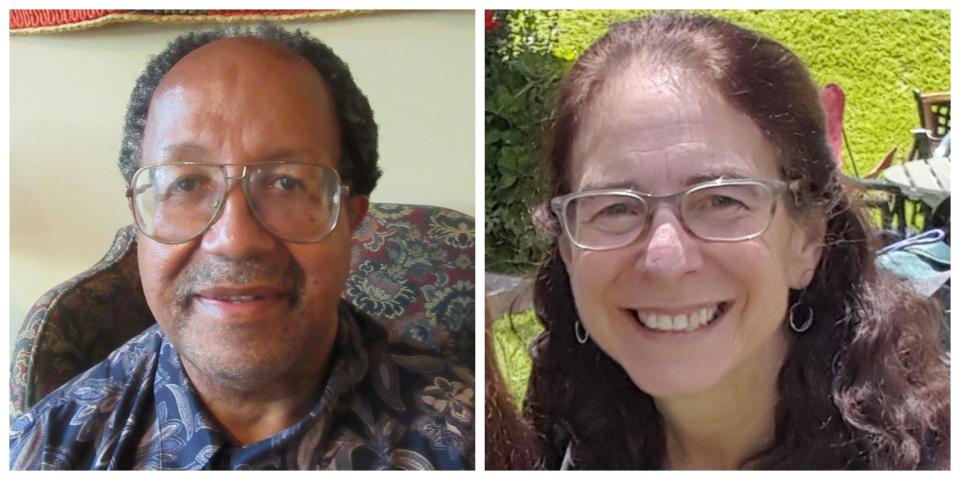Color Us Connected: Light pollution disrupts us more than we realize
This column appears every other week in Foster’s Daily Democrat and the Tuskegee News. This week, Guy Trammell, an African American man from Tuskegee, Alabama, and Amy Miller, a white woman from South Berwick, Maine, write about light pollution.
By Guy Trammell
In the 1960s, my great aunt drove my grandmother from Detroit to visit us. With no all night noise and no bright metropolitan lights, they slept undisturbed here. They commented on how refreshed they felt, waking up in our Village of Greenwood.
In college on Vancouver Island, British Columbia, I was mesmerized one night to see the sky’s pulsating aurora borealis colors, aka the Northern Lights.
In the 1990s, a group of us met in the Tuskegee National Forest. With a spectacular view of the sky, we enjoyed a few hours watching a dazzling meteor shower.

Undisturbed sleep and sky watching are being snatched away from us by light pollution, which is any adverse effect of artificial light at night. This includes the domes of light over cities that prevent us from seeing stars.
The United States wastes 17.4 billion kilowatt hours annually shining artificial lighting up into the atmosphere, costing $2.2 billion. In nature, artificial city lights lure migrating song birds hundreds of miles to their deaths. It distorts predator-prey interactions and disrupts animal hormones. Smoke and dust intensifies it.
Those suffering with long Covid could benefit greatly from full and uninterrupted rest in darkness. Unnatural light suppresses our immune system and disrupts our natural day/night cycle. It gives rise to obesity, diabetes and depression. Our melatonin production is interrupted, which increases hormone-related cancers in breast and prostate.
Thirty-seven percent of United States citizens are not able to use our night vision. Overly bright light reduces perception of fine details and colors, especially in seniors, and shadows appear darker.
We should avoid glare when the intensity gets uncomfortable, and reduce light trespass, which is light from windows or doorways. Let’s work to reduce light pollution. Lighting should be directed toward the ground, not up into the sky, and at certain times turned off entirely.
Black people used the Underground Railroad to escape the horrific life on plantations. They moved to each Underground Railroad location on moonless nights when the pitch dark kept them from being seen. In that darkness, they used the stars as a guide to freedom.
Our eyes are deliberately designed so that our rods can perceive the faintest of light sources, down to three photons. This allows us to see light from the most distant stars. This is a privilege we should not be denying future generations.
Let’s go out and enjoy one of the most amazing displays of all time - our nighttime sky! Summer is a great time for watching. Get a blanket and lie on the grass or recline in a lounge chair and enjoy!!
By Amy Miller
There are so many reasons we should keep our skies dark, and yet.
And yet, from my own house on a hill, I look down at a private school whose parking lot stays brightly lit through the night, while a few hundred yards down the road, another private school has unshielded lights on lampposts lining the paths of the lush green campus.
And yet, in our town of little crime, a convenience store lights up the sky while the porch light on a neighbor’s house can blind you on an evening dog walk.
And yet, even though traffic in town is sparse after dark, a streetlight burns cattycorner from my bedroom, muted only by a shield installed after a neighbor’s complaint.
Across the country, streetlights line highways and punctuate corners. Businesses light up signs and parking lots long after closing. And residents burn porch lights, often shining into the eyes of drivers and the windows of neighbors.
Besides depriving us of dark star-lit skies, the off-hours brightness confuses birds, which fly into lit-up buildings. Animals of all stripes, including humans, suffer health impacts from messed up circadian rhythms and a night that is never truly dark.
And in the meantime, we all pay for wasted electricity and suffer a huge and needless addition to greenhouse gases.
So why do we persist with this unnecessary after-hours illumination? Why do we spend billions of extra dollars to shine lights into the sky?
Some people think lighting makes us safer, but study after study shows that in most cases the lights do nothing to add to public safety. As the Washington Post reported, “evidence is mounting that nighttime brightness may do little to stop crime, and in some cases may make it worse.”
The US Department of Energy estimates that “under 1% of light generated by luminaires reaches an occupant’s eye.” That means we don’t see or use 99% of artificial light we produce. That is a lot of money and greenhouse gases that could be avoided.
Astronomers have long fought for darker skies, pinpointing spots on Earth where stars shine brightest. But the movement for dark skies is spreading to the mainstream. My town’s lighting ordinance allows night lighting if it serves “security, safety and operational need” and does not have a “deleterious effect” on neighbors or drivers. It requires light fixtures be shielded so they can’t be seen directly by motorists, pedestrians or residents. This is a start, but enforcement comes next. And as my neighborhood shows, we have a ways to go.
Guy and Amy can be reached at colorusconnected@gmail.com.
This article originally appeared on Portsmouth Herald: Color Us Connected: Light pollution disrupts us more than we realize

